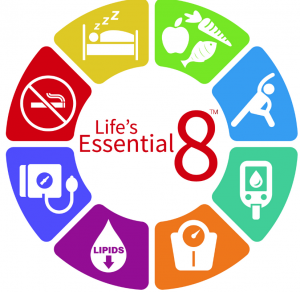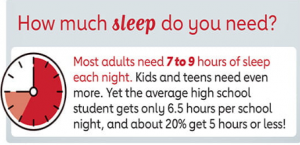Staff Report
The American Heart Association has added healthy sleep to its checklist measuring cardiovascular health, making its Life Essentials now 8.
Other health and lifestyle factors in the checklist are nicotine exposure, physical activity, diet, weight, blood glucose, cholesterol, and blood pressure.

The new sleep metric suggests 7-9 hours of sleep daily for optimal cardiovascular health for adults – and more for children depending on age. Yet one in three adults don’t get enough sleep. And studies show that the average high school student gets only 6.5 hours per school night, and about 20% get 5 hours or less.
The new checklist was reported in Circulation, the Association’s peer-reviewed journal.
Cardiovascular disease is the number one cause of death in the U.S. and globally.
According to the Association’s 2022 Heart Disease and Stroke Statistics Update, approximately 121.5 million people in the U.S. have high blood pressure, 100 million have obesity, more than 28 million people have Type 2 diabetes, and only 1 in 4 adults reported achieving the recommended levels of physical activity and exercise.
Various research studies over the past two decades indicate more than 80% of all cardiovascular events may be prevented by healthy lifetstyle and management of known cardiovascular risk factors.

“The new metric of sleep duration reflects the latest research findings: sleep impacts overall health, and people who have healthier sleep patterns manage health factors such as weight, blood pressure or risk for Type 2 diabetes more effectively,” said American Heart Association President Donald M. Lloyd-Jones, M.D., Sc.M., FAHA, who led the advisory writing group and is chair of the department of preventive medicine, the Eileen M. Foell Professor of Heart Research and professor of preventive medicine, medicine and pediatrics at Northwestern University’s Feinberg School of Medicine in Chicago. “In addition, advances in ways to measure sleep, such as with wearable devices, now offer people the ability to reliably and routinely monitor their sleep habits at home.”
The CDC advises people to:
• Go to bed and wake up at the same time every day, weekends included.
• Sleep in a dark, quiet place set at a comfortable temperature.
• Ban electronic devices from the bedroom. These can interfere with sleep.
• Avoid caffeine, alcohol and large meals before hitting the pillow.
• Exercise. Physical activity during the day makes it easier to fall asleep that night.
See more information on Life’s Essential 8 here.
















